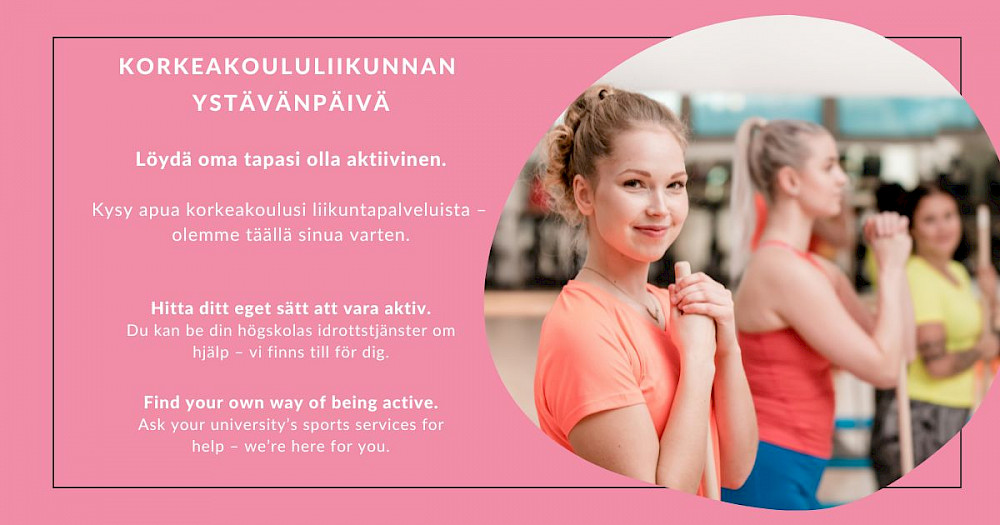♥ Valentine’s Day workout tips from Nyyti ♥ How to manage your stress levels through exercise
Student life can be busy. You’re feeling stressed, and it can be difficult to fit in workouts in your hectic life. But here’s the good news: you don’t need to work out, it’s enough to just get active in your daily life! Exercise can also be a great tool for managing stress. Of course, having sports as a hobby will enhance the benefits of exercise even more.

We’re all well aware of the benefits of exercise on our physical health, but it also has a significant impact on our mental health. Moving your body reduces the levels of stress hormones in your body and improves your stress tolerance. The stress-reducing mechanism of exercise can be seen in how it helps you manage the fight or flight response. Physical activity will also put the body in a state of stress, but as soon as you stop the activity, the body will receive an “all-clear” signal from the brain, and it will ease your stress. Stopping work doesn’t stop the stress reaction in the same way; instead it can remain in the body and become chronic. That’s why it’s a good idea to schedule in your exercise after a stressful day of studying. Exercise, and particularly exercise in nature, will also take your mind off your coursework.
Physical activity also improves mental health in other ways. Good mental health is based on comprehensive wellbeing. Comprehensive well being includes physical activity, nutrition, sleep, recovery and social relationships. The different areas of wellbeing can be seen to form an equation where the result is made up of the products of the different parts. It’s basically a matter of multiplication. If any of the areas is a zero, then the total will also be zero. For many, exercise is a good way to start a positive circle. When we can add physical activity into our day it also helps us sleep better, motivates us to make better food choices, and gives us more energy for social situations. So this improves all the different areas, while also increasing the likelihood of good mental health.
So physical activity supports both mental health and study life. You will get the biggest benefit from exercising if you can do it regularly. It can make sense to schedule in one’s workouts to the end of stressful days. It’s also good to remember that sports as a hobby are a good thing, but everyday activity is more important.
Based on this information we might give the following recommendation: try to find your own way of being active. The best day to be active regularly is everyday exercise. Try to travel from A to B by foot or bike whenever possible, but especially at the end of stressful days. If you exercise or play sports as a hobby, it’s also a good idea to do this at the end of a day of studying. Most campuses offer great sports facilities which make it easier to combine exercise with your daily studies.
Wishing you a happy Valentine’s Day,
Tommi Yläkangas
Influencing Specialist
Nyyti ry
The article is part of Valentine's Day in University Sports campaign, which aims to shed light on the role of exercise as part of promoting the well-being and study ability of university students.
You may also be interested in
-
The Finnish Student Sports Federation invites students to test their exercise habits and study ability
Published:The Finnish Student Sports Federation (OLL) is reminding people in September and October of the importance exercise in maintaining and improving study ability.
-
Back to the wonderful yet stressful student life – how to take care of yourself in the autumn rush
Published:Returning to studies and everyday routines can be cause for celebration for one, and cause for tears for another. One person enjoys scheduling and planning, while another would like the holiday to continue for a bit longer. To make the start of the autumn a little more enjoyable, we’ve put together a few tips to brighten up your days.
-
90 minutes of wandering minds or focused learning?
Published:University lectures easily turn into sitting marathons. Breaks have been proven to improve learning, well-being and health, but how could we take five from these tight, 90-minute study sessions? This article published in Acatiimi, takes a look at the ways in which university students and lecturers could take breaks in sitting.
Read more about article: 90 minutes of wandering minds or focused learning?
Share this page
Page last updated 6.2.2023
